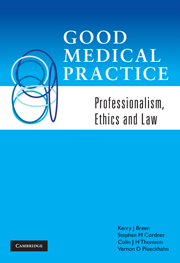Book contents
- Frontmatter
- Foreword
- Contents
- List of tables
- Preface
- Preface to the 1997 edition
- Acknowledgments
- About the authors
- Table of cases
- Table of statutes
- 1 Ethical principles for the medical profession
- 2 Ethical and legal responsibilities of medical students
- 3 Communication skills
- 4 Consent and informed decision making
- 5 Confidentiality, privacy and disclosure
- 6 Medical records, reports and certificates
- 7 Negligence, professional liability and adverse events
- 8 The regulation of the medical profession
- 9 Health care complaints systems
- 10 The doctor and sexual boundaries
- 11 Personal health of the doctor: illness and impairment
- 12 Maintenance of professional competence
- 13 Ethics and the allocation of health-care resources
- 14 The Australian health-care system
- 15 The doctor and interprofessional relationships
- 16 Entering and leaving practice and practice management
- 17 Clinical research
- 18 Prescribing and administering drugs
- 19 Diagnosing and certifying death and the role of the coroner
- 20 Births, reproductive technology, family law and child protection
- 21 Termination of pregnancy and related issues
- 22 Withholding or withdrawing treatment in the seriously or terminally ill
- 23 The law and the mentally ill
- 24 The law and courts of law in Australia
- 25 Medico-legal examinations and reports, court procedures and expert evidence
- 26 Other legislation relevant to medical practice
- APPENDIX 1 AMA CODE OF ETHICS – 2004
- Index
- References
APPENDIX 1 - AMA CODE OF ETHICS – 2004
- Frontmatter
- Foreword
- Contents
- List of tables
- Preface
- Preface to the 1997 edition
- Acknowledgments
- About the authors
- Table of cases
- Table of statutes
- 1 Ethical principles for the medical profession
- 2 Ethical and legal responsibilities of medical students
- 3 Communication skills
- 4 Consent and informed decision making
- 5 Confidentiality, privacy and disclosure
- 6 Medical records, reports and certificates
- 7 Negligence, professional liability and adverse events
- 8 The regulation of the medical profession
- 9 Health care complaints systems
- 10 The doctor and sexual boundaries
- 11 Personal health of the doctor: illness and impairment
- 12 Maintenance of professional competence
- 13 Ethics and the allocation of health-care resources
- 14 The Australian health-care system
- 15 The doctor and interprofessional relationships
- 16 Entering and leaving practice and practice management
- 17 Clinical research
- 18 Prescribing and administering drugs
- 19 Diagnosing and certifying death and the role of the coroner
- 20 Births, reproductive technology, family law and child protection
- 21 Termination of pregnancy and related issues
- 22 Withholding or withdrawing treatment in the seriously or terminally ill
- 23 The law and the mentally ill
- 24 The law and courts of law in Australia
- 25 Medico-legal examinations and reports, court procedures and expert evidence
- 26 Other legislation relevant to medical practice
- APPENDIX 1 AMA CODE OF ETHICS – 2004
- Index
- References
Summary
Editorially revised 2006 (reproduced with permission)
Members are advised of the importance of seeking the advice of colleagues should they be facing difficult ethical situations.
PREAMBLE
The Australian Medical Association (AMA) Code of Ethics articulates and promotes a body of ethical principles to guide doctors' conduct in their relationships with patients, colleagues and society.
This Code has grown out of other similar ethical codes stretching back into history including the Hippocratic Oath.
Because of their special knowledge and expertise, doctors have a responsibility to improve and maintain the health of their patients who, either in a vulnerable state of illness or for the maintenance of their health, entrust themselves to medical care.
The doctor–patient relationship is itself a partnership based on mutual respect and collaboration. Within the partnership, both the doctor and the patient have rights as well as responsibilities.
Changes in society, science and the law constantly raise new ethical issues and may challenge existing ethical perspectives.
The AMA accepts the responsibility for setting the standards of ethical behaviour expected of doctors.
THE DOCTOR AND THE PATIENT
Patient care
Consider first the well-being of your patient.
Treat your patient with compassion and respect.
Approach health care as a collaboration between doctor and patient.
Practise the science and art of medicine to the best of your ability.
Continue lifelong self-education to improve your standard of medical care.
Maintain accurate contemporaneous clinical records.
Ensure that doctors and other health professionals upon whom you call to assist in the care of your patients are appropriately qualified.
[…]
- Type
- Chapter
- Information
- Good Medical PracticeProfessionalism, Ethics and Law, pp. 399 - 405Publisher: Cambridge University PressPrint publication year: 2010



